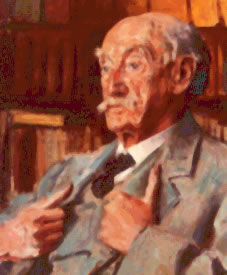Thomas Hardy was a poet and novelist who set much of his work, including Tess of the  d'Urbervilles, in the imaginary county of Wessex in southwestern England. Hardy was born in 1840 in Dorset, the son of a stonemason and builder, growing up on an isolated cottage on the edge of a heath. He was apprenticed to an architect and in 1862 moved to London to become a draftsmen. Due to ill health, he returned to work in Dorset in 1867. Engaging in intense private study he had once hoped to become a priest but with the loss of his religious faith his interest was directed towards poetry. When his poems failed to be published, he reluctantly started writing prose and met with mixed success. In 1883, he settled in Dorchester and attempted to establish himself in the professional middle-class, despite his humble origins. Following the hostile reception to Jude the Obscure in 1895, Hardy gave up prose entirely and returned to writing poetry, publishing several volumes of verse. He remarried in 1914 following the death of his estranged wife Emma. He died in Dorchester in 1928 and his ashes were buried in Westminster Abbey and his heart in his childhood parish.
d'Urbervilles, in the imaginary county of Wessex in southwestern England. Hardy was born in 1840 in Dorset, the son of a stonemason and builder, growing up on an isolated cottage on the edge of a heath. He was apprenticed to an architect and in 1862 moved to London to become a draftsmen. Due to ill health, he returned to work in Dorset in 1867. Engaging in intense private study he had once hoped to become a priest but with the loss of his religious faith his interest was directed towards poetry. When his poems failed to be published, he reluctantly started writing prose and met with mixed success. In 1883, he settled in Dorchester and attempted to establish himself in the professional middle-class, despite his humble origins. Following the hostile reception to Jude the Obscure in 1895, Hardy gave up prose entirely and returned to writing poetry, publishing several volumes of verse. He remarried in 1914 following the death of his estranged wife Emma. He died in Dorchester in 1928 and his ashes were buried in Westminster Abbey and his heart in his childhood parish.
Hardy’s first novel to successfully display his distinctive style was Under the Greenwood Tree (1872), featuring a simple story that directly reflects the social changes of the time. Far from the Madding Crowd (1874) gained him fame and introduces Wessex for the first time. It contains Hardy’s distinctive blend of humour, melodrama, tragedy and pastoral in an agricultural setting where the forces of nature shape human destiny. The Return of the Native (1878) was admired for effectively evoking the desolate heath lands where he grew up. Based on details of Dorchester’s own history and perhaps his own social struggles The Mayor of Casterbridge (1886) depicts a vigorous man’s rise from labourer to mayor, only to be striped of all he owns and loves by a calculating protégé. Sexual politics and socio-economic issues dominate in The Woodlanders (1887). He also published several volumes of short stories including Wessex Tales (1888). Hardy’s final two novels were his most controversial, though now regarded as his best and most progressive, both focusing on society’s sexual mores. In Tess of the d'Urbervilles (1891) a milkmaid is driven to murder and in Jude the Obscure (1895) the protagonist rejects conventional morality to live and have children with the woman he loves whilst married to another.
Hardy’s first significant poetic debut was Wessex Poems (1898) and like later collections was perceived as miscellaneous and uneven. The death of his estranged wife stirred Hardy to regret and remorse expressed in After a Journey, The Voice, and Poems of 1912–13, regarded as his best poetry. The Dynasts (1903-08) is a huge poetic drama in blank verse and subtitled “an epic-drama of the War with Napoleon”. This portrays Hardy’s representation of a universe governed by the aimless activities of a blind, indifferent fate that he called the Immanent Will. This is a similar theme to that of his novels; the characters are at the mercy of their own passions and not masters of their fortune.
Q